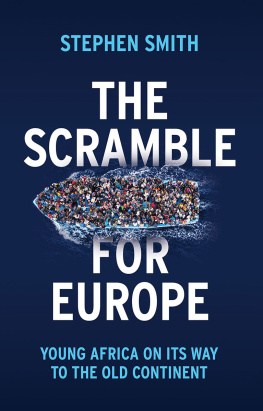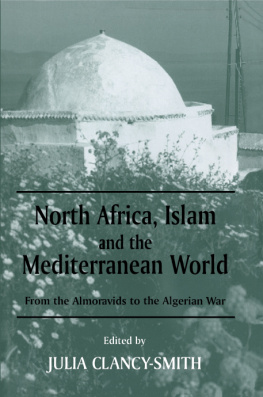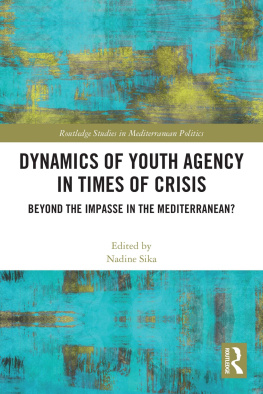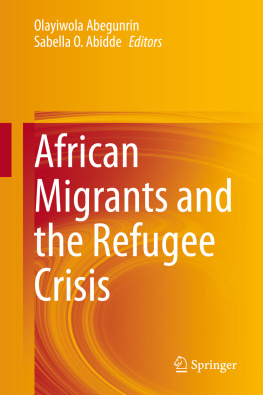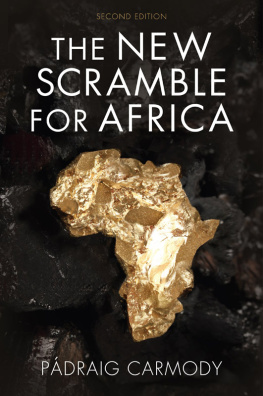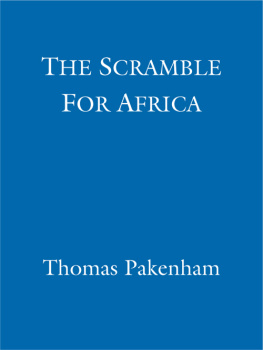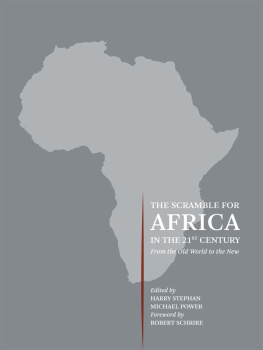
For Charlie and Anne
The Scramble for Europe
Young Africa on its Way to the Old Continent
Stephen Smith
polity
First published in French as La rue vers lEurope ditions Grasset & Fasquelle, 2018
This English edition Polity Press, 2019
Polity Press
65 Bridge Street
Cambridge CB2 1UR, UK
Polity Press
101 Station Landing
Suite 300
Medford, MA 02155, USA
All rights reserved. Except for the quotation of short passages for the purpose of criticism and review, no part of this publication may be reproduced, stored in a retrieval system or transmitted, in any form or by any means, electronic, mechanical, photocopying, recording or otherwise, without the prior permission of the publisher.
ISBN-13: 978-1-5095-3458-6
A catalogue record for this book is available from the British Library.
Library of Congress Cataloging-in-Publication Data
Names: Smith, Stephen, 1956- author.
Title: The scramble for Europe : young Africa on its way to the old continent / Stephen Smith.
Description: Medford, MA : Polity, 2019. | Includes bibliographical references and index.
Identifiers: LCCN 2018046811 (print) | LCCN 2018055560 (ebook) | ISBN 9781509534586 (Epub) | ISBN 9781509534562 (hardback) | ISBN 9781509534579 (pbk.)
Subjects: LCSH: Human geography--Africa, Sub-Saharan. | Human geography--Europe. | Africans--Migration. | Africans--Europe. | Immigrants--Europe. | Africa, Sub-Saharan--Emigration and immigration. | Europe--Emigration and immigration.
Classification: LCC GF701 (ebook) | LCC GF701 .S62 2019 (print) | DDC 304.8/406--dc23
LC record available at https://lccn.loc.gov/2018046811
The publisher has used its best endeavours to ensure that the URLs for external websites referred to in this book are correct and active at the time of going to press. However, the publisher has no responsibility for the websites and can make no guarantee that a site will remain live or that the content is or will remain appropriate.
Every effort has been made to trace all copyright holders, but if any have been overlooked the publisher will be pleased to include any necessary credits in any subsequent reprint or edition.
For further information on Polity, visit our website: politybooks.com
Acknowledgements
This book is a labour of friendship. It would not exist without the generous help of those who have seen me through first the process of writing the French original and then the similarly daunting task of producing a belle infidle in English an entirely updated and reworked version, purged of (almost) all of my beloved Gallicisms and the scoriae of half-baked thought. In France, Olivier Nora, my publisher at the helm of Grasset, and Ronald Blunden, the head of communications for the Hachette Group (who even made detours to my home in North Carolina), have been inexhaustible sources of excellent counsel. In the United States, T. R. Goldman and Sam Fury Childs Daly a fellow journalist and a fellow Africanist at Duke have done yeomans service to standardize my idiosyncratic English (I grew up speaking German with my mother and have lived outside the US, in Europe and Africa, for forty-five years). In England, Mark Huband with whom I wrote joint dispatches out of Monrovia in the early 1990s, when the Liberian capital was besieged by Charles Taylor also offered more than one welcome suggestion. And, finally, Jeremy Harding, a contributing editor of The LondonReview of Books who lives in southwestern France, went through the final draft and laid it all to rest. I owe him more than any words of thanks could convey. In the end, of course, I am solely responsible for the content of this book. Alas, it is less perfect than the support I received, including from my new friends in the making at Polity Books, John Thompson and the entire team.
Further, I want to acknowledge my debt to Richard Cincotta, the director of demographic studies at the Stimson Center in Washington DC, to whom I owe my discovery of the human geography of Africa. With kindness and patience, he introduced me to the complexities of his world.
My thanks also go to Charles Piot and Achille Mbemb. Together, we organized two international migration conferences at Duke University, which gathered scholars from across Africa, Europe and North America. This book owes a great deal to their numerous insights.
Last but not least, I will be forever grateful to all the African migrants in Africa, Europe and the United States for their trust in sharing their life stories with me. They sent me on the journey that eventually led to this book.
Introduction: A View from the Top of the Population Pyramid
At the Summer Olympic Games in London in 2012, the oldest competitor was a Japanese equestrian, Hiroshi Hoketsu. At seventy-one, he had qualified for the games for the third time. The youngest athlete, Adzo Kpossi, a thirteen-year-old swimmer from Togo, was competing in the 50-metre freestyle. Neither won a medal, but the two athletes did represent opposite ends of the global demographic spectrum. Hoketsu came from a state that since the 1970s has had the oldest population in the world. Kpossi came from a small country in sub-Saharan Africa, a region with the largest concentration of young people anywhere on the planet. That a Togolese girl and a Japanese man represented the bottom and top of the Olympic age pyramid was not entirely accidental, any more than the fact that London, just a few years later, would become the first European capital to elect a Muslim as its mayor, and a first-generation Briton at that. The May 2016 election of Sadiq Khan, born on British soil to parents who had arrived from Pakistan in 1970, was, for some, emblematic of Londons cosmopolitan character. For others, it was a confirmation of their worst fears: they were becoming strangers in their own land. The polarized readings reflect Londons radically changed demographics. In the 1950s, the British capital had roughly the same number of inhabitants as today, but an overwhelming majority of Londoners had parents as well as grandparents who were British. Now, more than half of the citys inhabitants are either first or second-generation immigrants (Collier 2013: 129).
Ordinarily, the subject of human geography, or demography as its more often called, tends to make ones eyes glaze over. Beyond the complicated statistics and age-related cohorts, there is also a question of scale. Demographic changes take place too slowly to be noticed in the day-to-day, until that moment of coalescence when they are suddenly blindingly obvious. It happened, as things do, imperceptibly, in many ways at once, James Baldwin wrote in his 1962 Letter From a Region in my Mind, referring to his own sudden awakening about the pervasiveness of American racism. Two years after Baldwins essay, Peter Griffith, the Conservative candidate in British parliamentary elections in Smethwick, a coal and steel town near Birmingham in the West Midlands, ran on the slogan If you want a nigger for a neighbour, vote Liberal or Labour. Nationally, after thirteen years in opposition, Labour coasted to victory with a comfortable margin. But in Smethwick, Griffith defeated the Labour MP Patrick Gordon Walker, even though the latter had been widely expected to become the partys next foreign secretary. At the time, Smethwick was thought to be an anomaly, a short-lived racist flare-up. But after the UKs stunning June 2016 vote to exit the European Union, Smethwick suddenly stood out like a long-forgotten warning sign. Polish migrants were the referendums targets of choice: more than a million had moved to Great Britain in the five years following Polands entry into the EU in 2004. Racism, it turns out, is only one form of rejection among many. And Smethwick, now a town where white Britons account for only 38 per cent of the population, supported Brexit by a two-thirds margin. Among the reasons given by first and second-generation immigrants to explain the vote were, in order of importance: the preference given to EU citizens rather than members of the Commonwealth to settle in the UK; local shopkeepers refusal to accept Polish businesses as competitors; and opposition to the neoliberal policies of the European Union.
Next page
